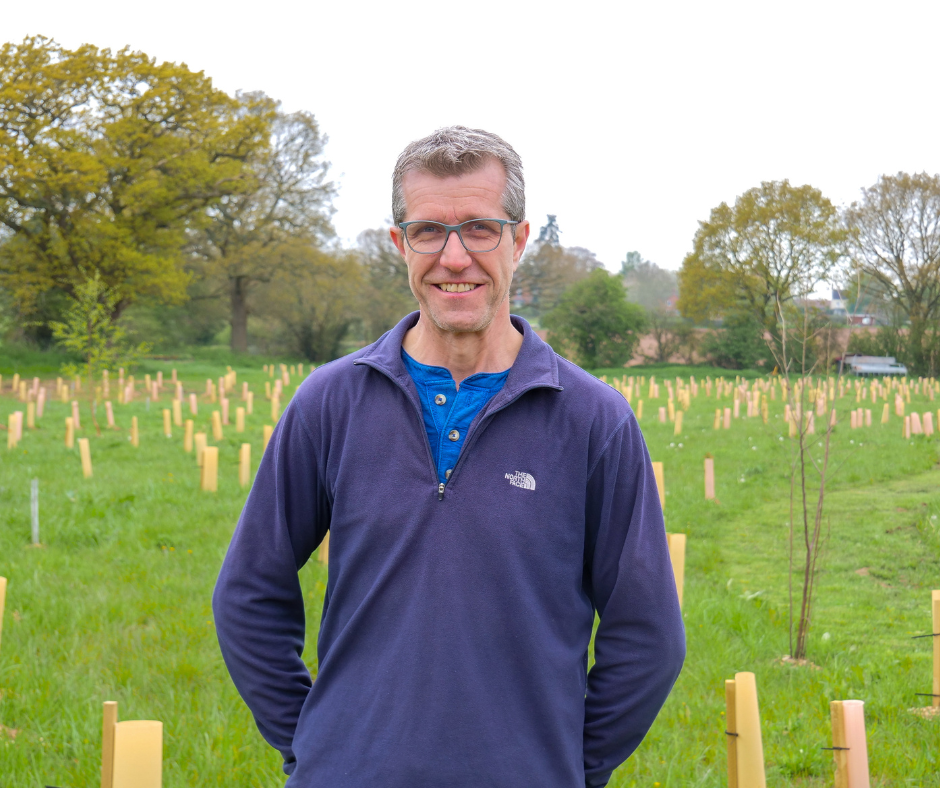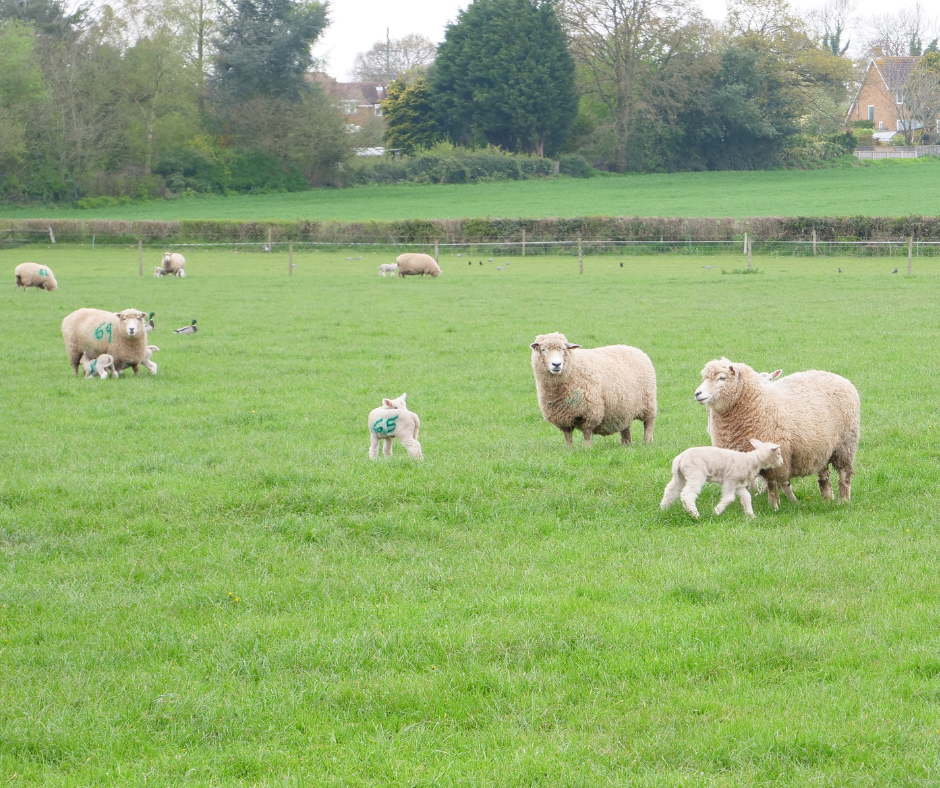Diversifying your farm with trees
3rd July 2023
To support diversity and biodiversity on their Shropshire farm, Mark and Liz Lea planted a woodland in February this year, supported by the Woodland Trust’s MOREwoods scheme.

Mark Lea is a third generation farmer, farming organically on his farm in Shropshire
Mark and Liz have been farming organically at Green Acres, in Shropshire, since 2000. Mark is the third generation of his family to run the farm, following in the footsteps of his father and grandfather before him. The farm has been within the family for over 100 years.
It’s a certified organic mixed arable and sheep farm, with a predominantly medium sandy loam soil, which is mostly in a five-year arable rotation including clover-based leys for seed, silage or grazing, as well as combinable wheat, oats and peas which are all grown for human consumption.

Green Acres Farm is a certified organic mixed arable and sheep farm
Diversity critical to success
The total farmed area, including both owned and tenanted land, is 175ha, with around 130ha of that dedicated to combinable crops.
The specialist milling wheat, including some unusual heritage varieties, are sold direct to millers and bakers all over the UK, and Mark recently branched out into milling his own wheat.
It’s a “deliberately over-complicated” wheat enterprise, which relies on diversity. Diversity is everything within an organic farm, and absolutely critical to the success of an organic system. Without intending to slip into clichés, Mark says the aim is to farm with nature, rather than against it; as a result, diversity and biodiversity feature throughout the farm.
Mark’s farm has had to adapt to the changing needs of the business over the years. Peas are grown for Hodmedods – a company which markets British peas and beans, and Green Acres grows the more unusual varieties for them.
Until 2020, the farm bred pedigree Hereford cattle; but partly as a reaction to the Covid-19 pandemic, during which Mark had to tend to the cattle by himself, the decision was made to concentrate on sheep instead. Now, approximately 200 New Zealand Romney ewes complement the arable element and improve the resilience of the business.
Green Acres hasn’t always been organic – it converted from conventional farming production in 2000, which Mark says was partly a business decision, in that he felt they needed to get out of conventional commodity grain production because they were too small to be competitive in that world; but largely it was due to concern about the impact of intensive arable farming on the environment.

Mark came across the Woodland Trust’s MOREwoods scheme while researching tree planting advice
Working with the Woodland Trust
Green Acres has undertaken a small degree of agroforestry over the last few years, planting avenues of trees with some support from the Woodland Trust at times.
Mark commented: “Liz and I created a small woodland 8–9 years ago, and this project made us realise how much difference a planting such as this could make in under 10 years; it proved that change can happen sooner than you might think.” It was the success of this small-scale woodland that made them decide to add another.
This time around, while researching planting advice, Mark came across the Woodland Trust’s MOREwoods scheme, funded by Lloyds Bank, which he thought seemed to be the perfect fit for a woodland of this scale.
“I completed the application form online in autumn 2022, then was contacted directly by our local Woodland Trust representative Jack Starbuck to discuss the eligibility of the idea I had already mapped out,” Mark explains. Jack then visited the site during the winter, at which time he began evolving the plan Mark had put together, as well as advising on the species list.
The Trust organised the ordering and delivery of the trees and guards in February 2023, and has supported the scheme at every step – and, crucially, provided a generous subsidy which allowed the farm to undertake the planting from a financial point of view. “The whole process was very smooth, very easy, and the support was generous – overall, both Liz and I are delighted with the result,” enthuses Mark.

Mark involved the local community in the planting of the trees
Planting the woodland
The farm works hard at being a part of the local community, so Mark advertised on the local noticeboard asking for volunteers to help with the planting. There was a tremendous turnout, and over 30 people joined forces to get over 800 trees in the ground in a single day.
“This goes to prove how helping the environment in such a way makes people feel good. It’s a powerful thing to be able to harness that positivity and pass it along to others,” Mark shares.
The farm has a biomass boiler so Mark wanted the woodland to have a productive element, and intends to coppice it in the future, so he opted for species which are suitable for coppicing – including hazel, alder and maple.
The trees have been planted in a curved formation, in 1.8m avenues which will allow Mark to mow between the rows for the first 2–3 years.
“As an organic farm, Green Acres cannot spot spray, so I find mowing to be the most effective option,” Mark explains. “Once the trees have matured and are less susceptible to the effects of competition, the grass will be left to its own devices to promote biodiversity.”
In case of drought, Mark left a wider meandering path around the woodland, down which he could drive a tractor with a long hose to irrigate the young saplings if absolutely necessary.
“As the trees were planted in the middle of February, when it was dry and clear, then experienced six weeks of very wet weather, I feel they have had an excellent start and are looking strong,” he comments.
“We absolutely wouldn’t hesitate to apply for further MOREwoods and MOREhedges, given the positive experiences we have had with the Woodland Trust,” he says.
Get involved in woodland creation
If you’re considering planting trees on your land, MOREwoods provides tailored advice and guidance from local woodland advisers along with the trees and tree protection you need for your project – and covers up to 75% of costs. Get in touch to find out more.


